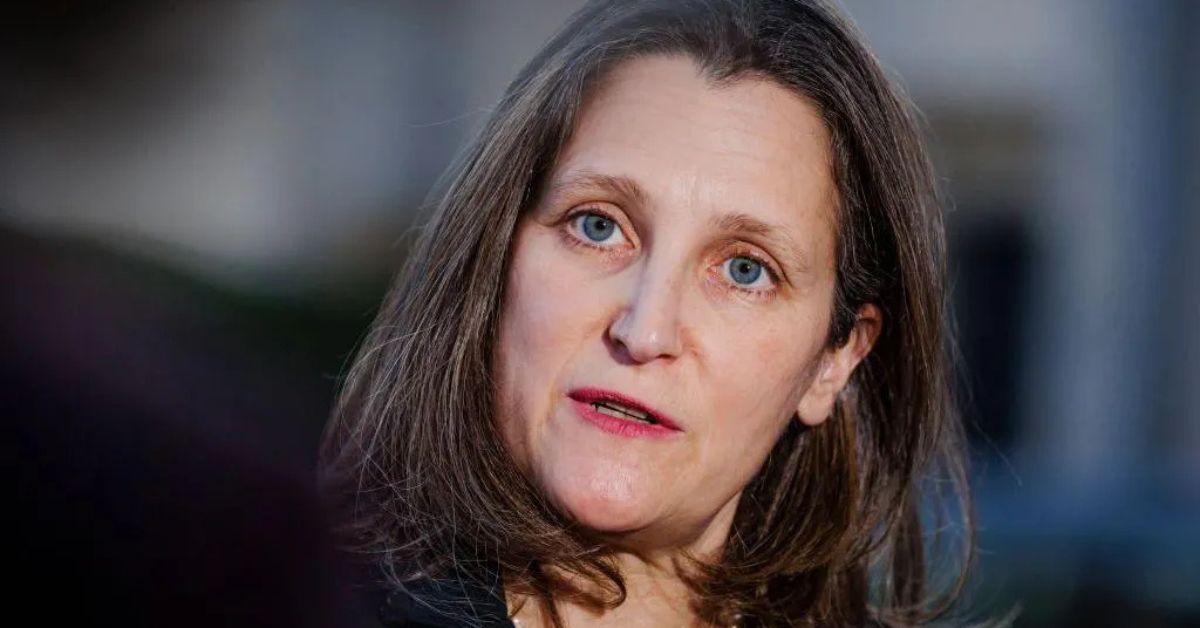Canada’s Finance Minister Chrystia Freeland has stepped down, citing disagreements with Prime Minister Justin Trudeau over how to tackle US President Donald Trump’s impending tariffs. Here’s everything you need to know about the resignation and its impact on Canada’s government and economy.
A Shocking Resignation in Canada’s Leadership
On Monday, Chrystia Freeland, Canada’s Deputy Prime Minister and Finance Minister, announced her resignation, marking a significant shake-up in Prime Minister Justin Trudeau’s cabinet. Her departure came amid rising tensions over the approach to US President Donald Trump’s controversial tariff policies.
Freeland’s resignation letter, addressed to Trudeau, detailed differences in economic strategies, particularly in dealing with Trump’s aggressive trade stance. The move could further destabilize Trudeau’s already fragile minority government and has drawn attention to ongoing fiscal challenges facing Canada.
Why Did Chrystia Freeland Resign?
Freeland’s resignation was driven by disagreements with Trudeau on how to handle the looming threat of tariffs imposed by Donald Trump. Trump’s “America First” economic nationalism and plans to levy tariffs on Canadian goods put Canada’s economy at risk, prompting Freeland to take a strong stand on fiscal prudence. She felt that Canada’s response to these challenges should be grounded in “unity” and fiscal restraint.
Freeland also expressed concerns about Trudeau’s proposed economic policies, including direct cash payments to Canadians and temporary tax breaks during the holidays. Critics argue these initiatives are politically motivated, especially as Trudeau’s approval ratings have dropped dramatically, from 63% to 28% in recent months.
The Fallout: Trudeau’s Leadership Crisis and What’s Next for Canada
Freeland’s resignation has sent shockwaves through the Liberal Party, exacerbating an ongoing leadership crisis for Prime Minister Trudeau. Trudeau has already been under fire for his handling of the cost-of-living crisis and growing fiscal deficits. With a projected C$60 billion deficit for 2024, many are questioning whether Trudeau’s government can navigate these turbulent waters.
Following Freeland’s exit, Public Safety Minister Dominic LeBlanc was sworn in as her replacement. LeBlanc, known for his close relationship with Trudeau, may provide stability in the short term. However, opposition leaders like Pierre Poilievre are calling for an immediate federal election, arguing that Trudeau’s leadership is in a “spiral.”
Also Read: Best Universities in Australia 2025: Top Institutions Shaping Higher Education
Canada-US Trade Tensions: The Impact of Trump’s Tariffs
Freeland’s resignation comes at a time when US-Canada trade relations are under intense scrutiny. Trump’s threats to impose tariffs, including a 25% levy on Canadian imports, have been seen as an existential challenge for Canada’s economy. Economists warn that such tariffs could push Canada into a deeper economic crisis, significantly harming key industries like automotive and agriculture.
Freeland’s call to “push back against ‘America First’ economic nationalism” reflects a growing sentiment in Canada that the country must remain united and resilient in the face of these external pressures.
Trudeau’s Approval Rating and Canada’s Fiscal Deficit
The growing fiscal deficit in Canada, coupled with the declining approval rating of Trudeau, has placed the government under increasing pressure. Critics argue that policies like the C$250 cheques, which Trudeau’s government hoped would garner public favor, are an unsustainable response to Canada’s economic challenges.
With a C$60 billion deficit, the Trudeau government is facing mounting opposition not only from political rivals but also from within its own party. The departure of Freeland, who had served as a trusted economic adviser to Trudeau, could signal further fractures within the Liberal Party.
Also Read: Best Universities in Germany 2025: Top Institutions Shaping the Future of Higher Education
What’s Next for Trudeau and Canada’s Economy?
The resignation of Freeland has sparked calls for a leadership shake-up within the Liberal Party. Some members, like Ontario MP Helena Jaczek, have openly called for Trudeau’s resignation, viewing Freeland’s exit as a sign of lost trust and direction within the government. Trudeau must now navigate these turbulent waters, with several crucial policy decisions on the horizon.
The ongoing debate about Canada’s economic strategy and fiscal policies is expected to dominate the political landscape in the coming months. With federal elections scheduled for 2024, this resignation could have far-reaching implications for the political future of Canada.
Conclusion: A Turning Point for Canadian Politics
Chrystia Freeland’s resignation is more than just a political shake-up; it marks a turning point in the trajectory of Canada’s response to growing economic challenges. As the Liberal Party grapples with internal divisions, external pressures from the US, and mounting public dissatisfaction, the political and economic landscape of Canada is in flux.
With the upcoming federal election in 2024, Canadians are left to wonder if a change in leadership is on the horizon, and whether the country can recover from the storm brewing in its political and economic spheres.
